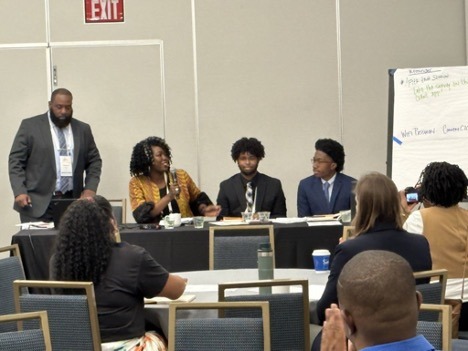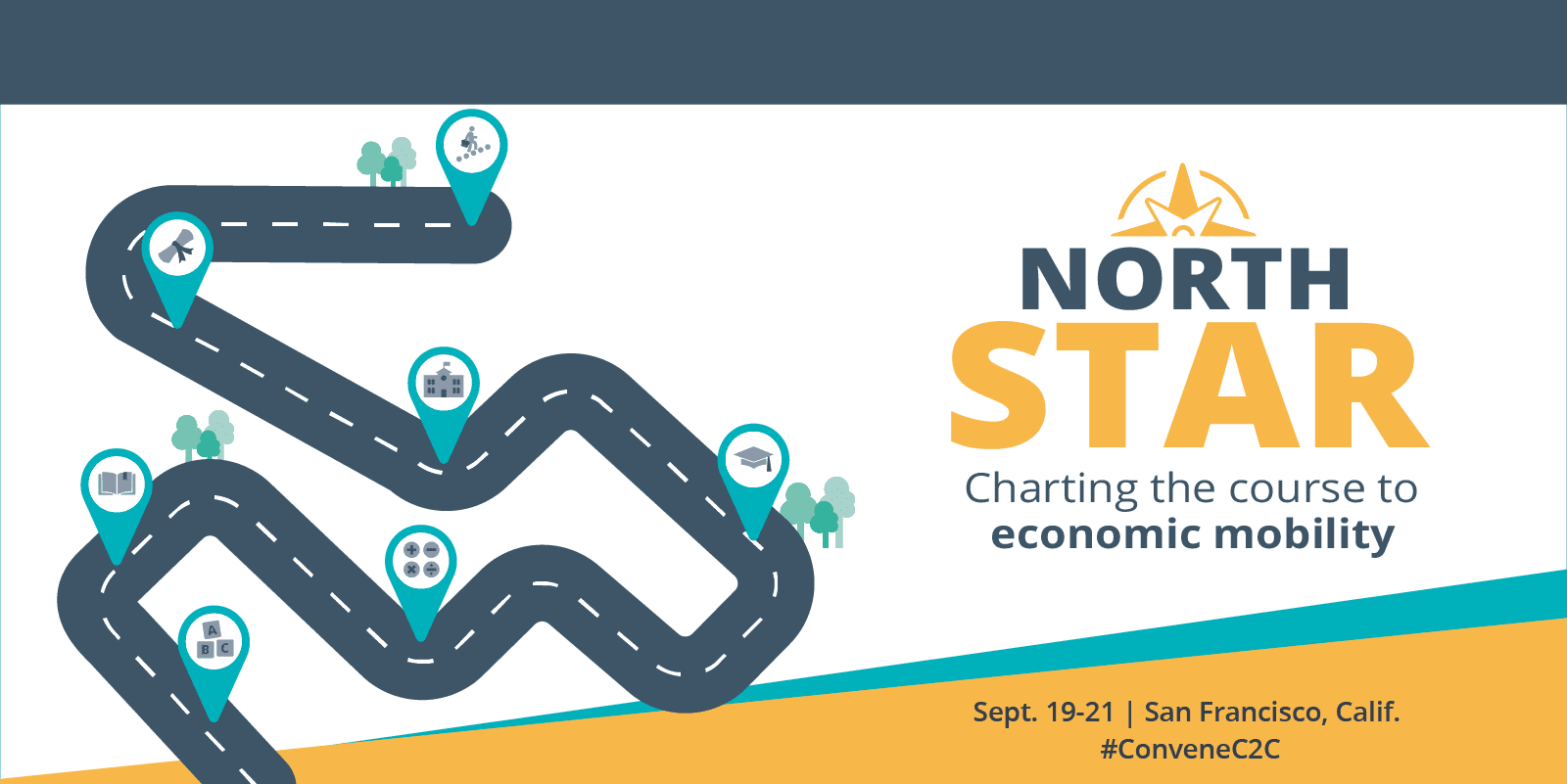At the 2023 Strive Together convening in San Francisco, centering student voice was a theme that ran through the conference from day one. The Generation Next team was proud to lift up that theme in a very direct way: live and in person.
Along with Minneapolis College Vice President of Equity and Inclusion Trumane Lindsey, Jr. and Saint Paul College Dean of Student Success Pepe Wonosikou, we hosted Culturally Sustaining Practices: An Ecosystem of Student & Administrative Collaboration on day 3 of the convening. Joining Lindsey and Wonosikou were Om Harris and Mahad Abdishakur, student leaders taking part in Saint Paul College’s iLEAD Fellowship Program and Minneapolis College’s Bridging the Equity Gap (BTEG) Bridge Scholarship Program.
The room was nearly full of StriveTogether network members eager to hear directly from students, and Mahad and Om did not disappoint, powerfully sharing the impact of their community college experiences.
“[BTEG] has taught me about accountability, being on time, networking, having a portfolio, a resume…and having access to meet people who teach you a lot about culture and the real world.”
Om went on to speak of the importance of “having Black male role models guiding us to the right path.” This message reminded us of Saint Paul College student Micah Coatie’s words at our 10-Year Anniversary Event in March. As Micah shared that day:
“To see a BIPOC male teaching you and giving you as much as possible is really rewarding.”
Mahad shared similar gratitude for his experience in Saint Paul College’s iLEAD program. He recalls having heard, “Go to college, go to college, go to college—and nobody is showing me the success route to actually go from college to a job to a career.”
That changed, he said, once he enrolled at Saint Paul College and joined iLEAD. With the program’s support, Mahad found a wealth of tools and resources that helped him make a range of key decisions, including connections to other students whose perspectives helped him choose the right classes. iLEAD has also helped him navigate the college experience while holding down two jobs. Ultimately, he credits iLEAD with helping him go from being a C student to an A student.

From left to right: Trumane Lindsey, Pepe Wonosikou, Mahad Abdishakur, and Om Harris
“I’m glad to be speaking about this,” shares Mahad. “because we need more people up here talking about success stories and not failure stories.”
The session cut across several themes important to our collective impact work, including Generation Next’s priority areas—namely Postsecondary Pathways and Teacher Diversity. Further, our coalition’s commitment to giving Om and Mahad a platform to share their experiences reflected the Generation Next Leadership Council’s ongoing goal of prioritizing BIPOC youth voice.
Also during the session, Lindsey and Wonosikou shared some of the key learnings from their colleges’ collaboration:
Lesson 1: Leadership that is actionable and improvement-minded sets the table for solving problems through an equity lens.
Lesson 2: Cross-departmental stakeholders and data are important for defining the problem.
Lesson 3: We must hold departments and programs accountable for evaluating and achieving equity goals.
Lesson 4: To create new equity-minded programs and strategies, innovations must appreciate, recognize, and learn from previous internal efforts.
Lesson 5: To solve for the right pain points, you have to design and assess your program with its users and implementers.
Lesson 6: Collective impact helped us learn, evaluate, and improve in ways that allow us to scale equity-minded strategies and practices.
(These lessons were included in our session’s handout, which you can see and download here.)
As the session wrapped up and the many Minnesota attendees prepared to fly back to the Twin Cities, Om’s words about the African principle of Sankofa came to mind. During the session, he explained the concept being focused on “where we were, where we are, and where we are going.” Words to strive by as Generation Next enters its second decade and the StriveTogether network leaves another annual convening reenergized to work toward systems change.
Reimagining systems from neighborhood to national
The convening’s final day opened with a panel focused on Mission Promise Neighborhood, an initiative of great interest to our team, given Generation Next’s close collaboration with Northside Achievement Zone and Saint Paul Promise.
Mission Economic Development Agency Chief Strategy Officer Richard Raya discussed Mission Promise with StriveTogether Chief Advancement Officer Colin Groth, explaining how San Francisco’s Mission district has seen success in greater kindergarten readiness and graduation rates. Just as critically, families in the area have also gained access to reliable healthcare and affordable housing. As Groth put it, “We have to reimagine our systems from neighborhood to national and invest in the infrastructure that brings this to life.”

